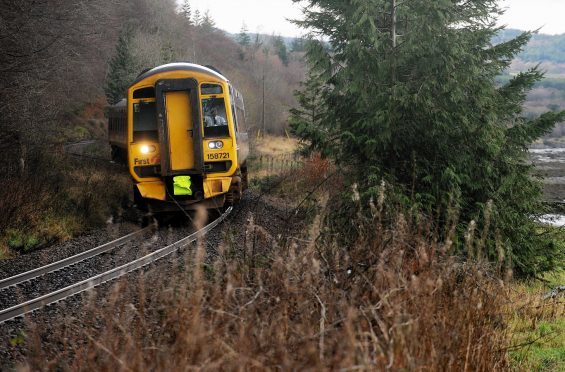Rail services to the far north are by far the worst performing in Scotland, shocking new punctuality figures show.
Only 64.2% of trains arrived at Wick station within five minutes of their scheduled time – the lowest rate across the country.
And just 38.1% of services were within one minute of their booked arrival time, the fourth worst performance in that category for the 12 months to the end of April.
Highland transport chiefs said that a series of 14 cancellations last month had a severe impact on the figures for the service to Wick.
Four of the worst six performing stations against the five minute target were all on the Far North Line, with Wick on 64.2%, Tain achieving it 77.1% of the time, Inverness in 78.6% of cases, and Invergordon on 79.3%.
The national average was 90.03%, according to new monthly annual average statistics from ScotRail.
The route between Inverness and Caithness has been beset with problems in recent years, prompting the Scottish Government to establish the Far North Line Review Group last year.
Gail Ross, SNP MSP for Caithness, Sutherland and Ross, said: “These are undoubtedly challenging figures.
“At the end of last year the Scottish Government set up the Far North Line Review Group. This group was tasked with finding solutions to the issues that face the line and improving services. I fully expect that they will be focussing on this situation.
“However it has to be recognised that the line has suffered from decades of under investment which means that delays are almost inevitable. This under investment has also led to a drop in passenger numbers.”
Services to the west Highlands performed significantly better in the latest statistics, with trains to Fort William arriving within five minutes of schedule 89.7% of the time, to Kyle on 85.8% of services, Mallaig on 84.8% and Oban on 82.8%.
Frank Roach, manager at north transport partnership Hitrans, said: “The current monthly annual average figure across Scotland at 90.3% is just 0.1% short of target.
“However for the Highlands the table that shows all stations that have at least one terminating train per day, and in many cases many other trains calling there en route to somewhere else, it is still worse than the national average.
“Looking at the time to five minutes metric, which is the significant figure, the west Highlands are performing better than the far north.
“Inverness figures are affected by Wick performance, which after a couple of months of fairly good performance was hit with 14 cancellations in the week commencing May 22, 2017.
“There have been teething troubles with the radio signalling upgrade. There had been a marked improvement before that- even hitting 98% in March.
“The new timetable which came in on May 21 had a couple of minor retimes which also aids better performance.”
A ScotRail Alliance spokesman said: “We run 2,300 services every weekday – resulting in around 94 million passenger journeys a year – and on rare occasions some things go wrong.
“We recognise these occasions are frustrating for our customers caught up in them and every effort is made to keep them moving so that they can complete their journey.”
A Transport Scotland spokeswoman said: “It has been well documented already that ScotRail’s performance was not where it should have been, including on these routes, and Transport Scotland took action to ensure this was addressed quickly.
“Abellio ScotRail’s robust efforts to improve performance are evidence of this.
“Performance has improved over the last seven consecutive periods, bringing passengers closer to the rail service they both deserve and desire.”
